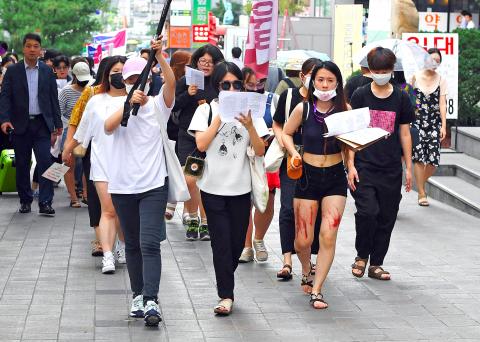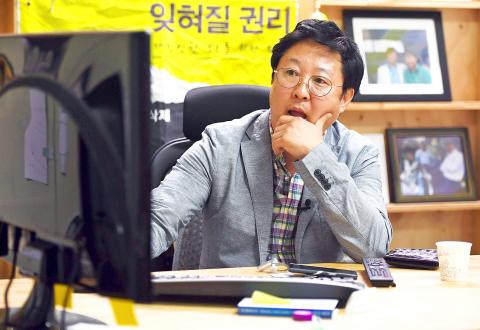Tony Kim has been paid to watch porn for the past six years, spending his days staring attentively at graphic videos of naked women and sexual liaisons.
He is part of an anti “revenge porn” force in Seoul tasked with finding private sexual images posted online without permission and then removing them.
The 27-year-old first applied for the role at Santa Cruise out of “curiosity,” Kim said.

Photo: AFP
“But I soon started to feel very uncomfortable, having to watch videos like this all day long, day in and day out,” he said. “Now I’m used to this and feel nothing. It is just a job now.”
The bleak business is part of the so-called “digital laundry” industry thriving in South Korea — a tech-savvy nation, but one whose culture remains chauvinistic and where objectifying women is common.
Chief executive Kim Ho-jin set up Santa Cruise in 2008, initially specializing in removing malicious online rumors or inaccurate information for local firms and celebrities, but a new type of client has emerged — women whose private sex videos and photographs have been posted online without permission by disgruntled ex-boyfriends, ex-husbands or malicious acquaintances.

Photo: AFP
“We monitor various porn, P2P [peer to peer] networks and social media sites around the clock, because such ‘leaked videos’ could pop up at any time, and over and over for years,” Kim Ho-jin said.
So-called “revenge porn” is a global phenomenon — one study showed that 2 percent of Americans who use the Internet have had such images posted — prompting social media giants such as Facebook to deploy countermeasures.
In South Korea, 7,325 requests to have intimate videos removed from the Internet were made last year, according to government figures, a sevenfold increase in four years.
This includes hidden camera footage posted by people using surveillance gadgets or smartphones to film women in changing rooms or public toilets.
Seoul has announced a sweeping policy package to battle online sex crimes, including a plan to make a prison term the minimum sentence for such crimes.
Some posters photoshop portraits of a female acquaintance onto pornographic pictures to spread the images online.
“Most offenders are teenage boys or men in their 20s who want to see pretty, popular girls out of their reach being abused and humiliated online,” Kim Ho-jin said.
One victim, whose name was withheld, said she quit her job and cut all contact with friends and family after her video emerged online.
“I was once a happy person who lived a normal life like everyone else,” she said in text messages shared by the Korea Cyber Sexual Violence Response Center. “Now I’m scared of just going outside and scared of the whole world.”
A sense of shame runs deep in the conservative, patriarchal nation, where women who appear in the videos face social stigma, said Seo Lang, head of the campaign group.
Seo said the police cybercrime unit is understaffed and overwhelmed, with police often blaming the victims — almost always women — for not having “behaved properly.”
“The price to pay for destroying a woman’s life is so light here,” Seo said.
At present only 6 percent of convicted uploaders are sentenced to prison, according to a study by the Korea Women Lawyers Association, with about 65 percent being fined.
The anonymous victim said the man who posted their intimate video online was only fined 1 million won (US$900), with a Web site that displayed it ordered to pay a 3 million won penalty.
“These Web sites scoff at the fine and never change, because they earn enormous profits every month by advertising and spreading videos of women like me,” she said.
Many videos are also used as online adverts for prostitution — illegal in South Korea — said Jang Woo-sung, a senior superintendent in the police’s cyberbureau.
About 140 women sign up for Santa Cruise’s services each month, Kim Ho-jin said.
Some have found footage of themselves — often via a male acquaintance sending them a link asking: “Is that you?” — while others are simply concerned that such images might have been shared.
Once Santa Cruise finds a video, the firm contacts the Web site operator — sometimes a gambling or social media site rather than a pornography sharing hub — to have it taken down, warning of violation of privacy laws.
Many comply quickly, but if they do not, or are unreachable, Santa Cruise asks Seoul’s Internet regulator to block access to the content, which can take weeks.
“No matter how many times we take it down, it’s nearly impossible to delete such videos completely from the Internet,” Kim Ho-jin said.
The service costs 2 million won a month — almost two-thirds the national average wage — a price that Kim Ho-jin defends on cost grounds, saying the monitoring effort goes on around the clock, but he fears the worst if clients running out of funds drop out of contact.
“When I’ve called them, sometimes their parents answered the phone, saying their daughter is dead,” he said.

Swedish campaigner Greta Thunberg was deported from Israel yesterday, the Israeli Ministry of Foreign Affairs said, the day after the Israeli navy prevented her and a group of fellow pro-Palestinian activists from sailing to Gaza. Thunberg, 22, was put on a flight to France, the ministry said, adding that she would travel on to Sweden from there. Three other people who had been aboard the charity vessel also agreed to immediate repatriation. Eight other crew members are contesting their deportation order, Israeli rights group Adalah, which advised them, said in a statement. They are being held at a detention center ahead of a

A Chinese scientist was arrested while arriving in the US at Detroit airport, the second case in days involving the alleged smuggling of biological material, authorities said on Monday. The scientist is accused of shipping biological material months ago to staff at a laboratory at the University of Michigan. The FBI, in a court filing, described it as material related to certain worms and requires a government permit. “The guidelines for importing biological materials into the US for research purposes are stringent, but clear, and actions like this undermine the legitimate work of other visiting scholars,” said John Nowak, who leads field

Former Nicaraguan president Violeta Chamorro, who brought peace to Nicaragua after years of war and was the first woman elected president in the Americas, died on Saturday at the age of 95, her family said. Chamorro, who ruled the poor Central American country from 1990 to 1997, “died in peace, surrounded by the affection and love of her children,” said a statement issued by her four children. As president, Chamorro ended a civil war that had raged for much of the 1980s as US-backed rebels known as the “Contras” fought the leftist Sandinista government. That conflict made Nicaragua one of

NUCLEAR WARNING: Elites are carelessly fomenting fear and tensions between nuclear powers, perhaps because they have access to shelters, Tulsi Gabbard said After a trip to Hiroshima, US Director of National Intelligence Tulsi Gabbard on Tuesday warned that “warmongers” were pushing the world to the brink of nuclear war. Gabbard did not specify her concerns. Gabbard posted on social media a video of grisly footage from the world’s first nuclear attack and of her staring reflectively at the Hiroshima Peace Memorial. On Aug. 6, 1945, the US obliterated Hiroshima, killing 140,000 people in the explosion and by the end of the year from the uranium bomb’s effects. Three days later, a US plane dropped a plutonium bomb on Nagasaki, leaving abut 74,000 people dead by the